Das Rheingold, Royal Opera - knotty, riveting route to destruction | reviews, news & interviews
Das Rheingold, Royal Opera - knotty, riveting route to destruction
Das Rheingold, Royal Opera - knotty, riveting route to destruction
Barrie Kosky and Antonio Pappano work superbly with a true team of singer-actors
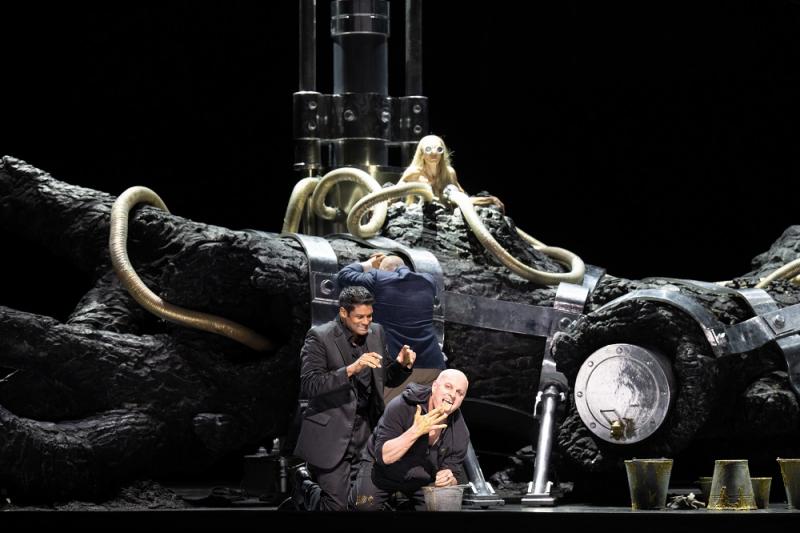
Let’s set aside, to begin with, the question of the concept, other than to praise it as consistent. Most vital about this brave new Rheingold is the vindication of director Barrie Kosky’s claim that “what makes a Ring production interesting is the detailed work within the scenes between the characters”. With a conductor as intent on clarity and meaning as Antonio Pappano, and a true ensemble of performers willing to go along with him and Kosky, the battle is three-quarters won.
The close co-ordination gives us plenty of new musical-dramatic insights in Wagner's half-joky, half-deadly "preliminary evening" to the three main Ring operas about the love of power versus the power of love. I'd go again simply for the interplay of the two finest singer-actors on the stage, Christopher Purves as gold-grabber, love-denier Alberich and Sean Pannikar reinventing, at Kosky's behest, the slippery fire demigod Loge, improvising a trick to steal the filthy lucre for the supposed immortals (the two pictured below in Scene 4). 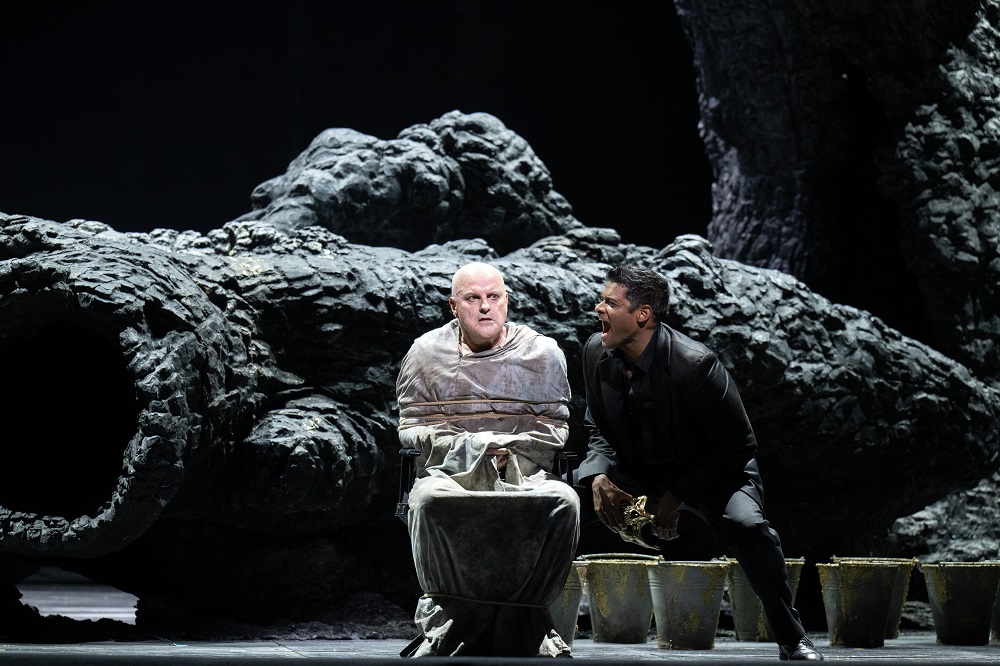 In tandem with a glowing orchestra Purves, making up in dramatic intensity for what he may just occasionally lack in baritonal heft up top, shows us Alberich's capacity to apprehend the good or glorious if powerless to be it as he sings, beautifully, of the "great ones" in the clouds, laughing and loving. Pappano interweaves the opera's scherzo with Loge's wheedling to perfection. Crystal-clear in diction, the meaning of the text physically articulated at most points, both performers are able to come close to whispering some of their lines, so good is the balance (a phenomenon I only noticed before in Ádám Fischer's Budapest Ring).
In tandem with a glowing orchestra Purves, making up in dramatic intensity for what he may just occasionally lack in baritonal heft up top, shows us Alberich's capacity to apprehend the good or glorious if powerless to be it as he sings, beautifully, of the "great ones" in the clouds, laughing and loving. Pappano interweaves the opera's scherzo with Loge's wheedling to perfection. Crystal-clear in diction, the meaning of the text physically articulated at most points, both performers are able to come close to whispering some of their lines, so good is the balance (a phenomenon I only noticed before in Ádám Fischer's Budapest Ring).
Yet the Nibelheim scene also falls a bit short at the last minute. We've had an appropriately terrifying tableau of liquid gold being pumped from the breasts of Erda (the focus of the entire production, an initially naked old woman played last night - superbly - by 82 year old Rose Knox-Peebles). The ravaged World Ash remains the main means of popping in and out, as it did for riverless Rhinemaidens, but Alberich's transformations into serpent and toad are underwhelming. There was more magic and childlike fun in two more wholly successful recent productions, Andreas Homoki's in Zurich - where Purves was also the dramatically superb Alberich - and Richard Jones's at English National Opera. Here the gods are deluded and detached, as they should be, but there's no supernatural dimension until the stunning moment when Erda embraces a stricken Wotan - moving to tears in a drama which doesn't lend much scope for human emotion. Kosky is honest - and right - about finding this idea one of the few things worth salvaging from what he calls, in a typically pithy programme interview, his first, "trainwreck" production of the Ring over a decade ago.
You shouldn't have to be told about his new notion that Mother Earth is dreaming fragments of the story after "we've disappeared from the earth". Nothing works better for the low E flat that kicks off an unshifting, minimalist prelude than total darkness - in Zurich even the lights on the players' stands were switched off to begin with - so strip-lighting and a slight head-scratching about why the blasted tree, and why so decimated when Wotan only removed a branch which looks like an incinerated cactus, rather than the depths of the Rhine take up too much headspace at the beginning. 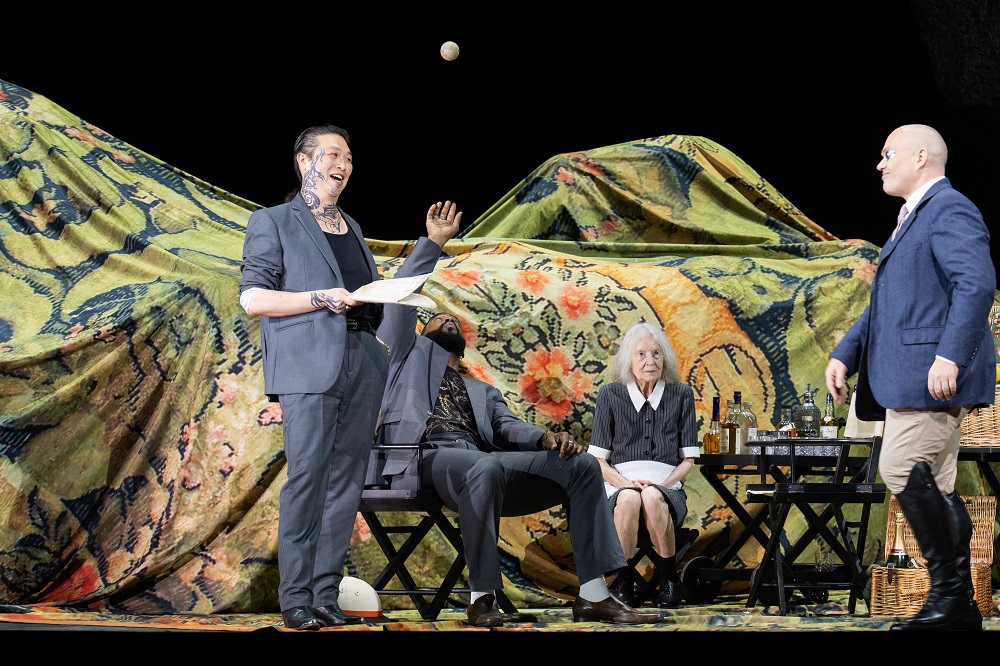 The gods' hunting-party picnic is a witty shot at our despoliation of nature, the pump in Nibelheim a very dark one. The buckets of liquid gold get a bit complicated, if you take them too literally, when Freia is being covered in a bathtub (forgiven - the image is a powerfully degrading one). The ending is bewitching but not new; I hazard a guess it was with the full consent of his friend and collague Jones that Kosky took over the brilliant ENO idea of falling rainbow tinsel at the end - the picture here is different only by virtue of the revolving Erda, the way the tinsel stops and then starts up again (pictured below: Rodrick Dixon as Froh, Kiandra Howarth as Freia, Christopher Maltman as Wotan, Marina Prudenskaya as Fricka and Kostas Smorginas as Donner).
The gods' hunting-party picnic is a witty shot at our despoliation of nature, the pump in Nibelheim a very dark one. The buckets of liquid gold get a bit complicated, if you take them too literally, when Freia is being covered in a bathtub (forgiven - the image is a powerfully degrading one). The ending is bewitching but not new; I hazard a guess it was with the full consent of his friend and collague Jones that Kosky took over the brilliant ENO idea of falling rainbow tinsel at the end - the picture here is different only by virtue of the revolving Erda, the way the tinsel stops and then starts up again (pictured below: Rodrick Dixon as Froh, Kiandra Howarth as Freia, Christopher Maltman as Wotan, Marina Prudenskaya as Fricka and Kostas Smorginas as Donner).
Yet it works, and if some audience members like those behind me are offended by the grim nature of Rufus Didwiszus' sets up to that point, for me Alessandro Carletti's lighting is perfectly modulated. Nor should one object to curtain-down on the orchestral interlude; the gold frame of the proscenium arch is rightly accentuated. 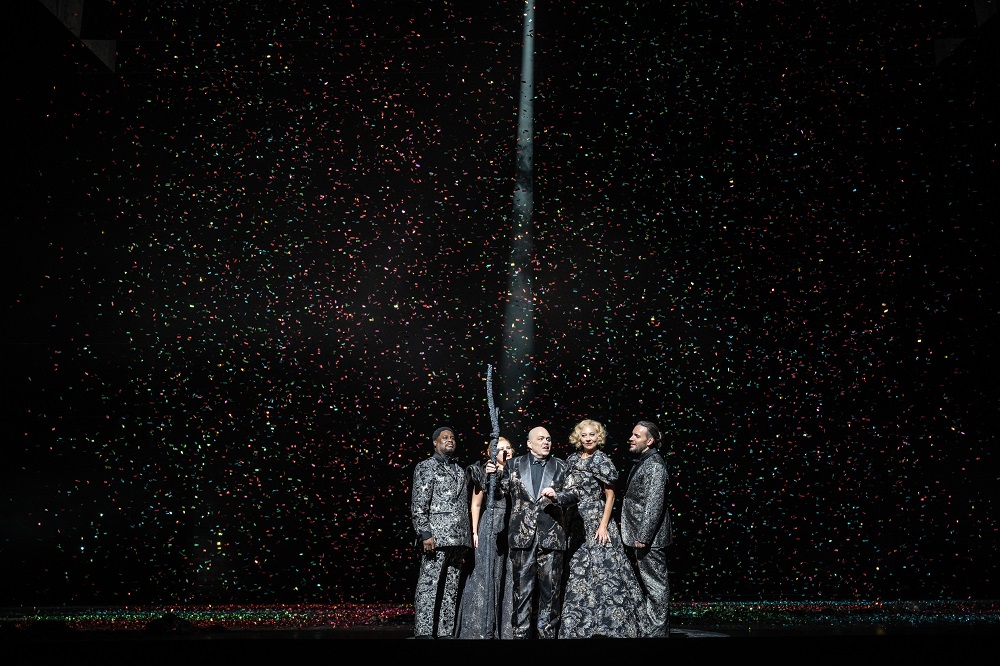 Kosky always asks a lot - sometimes too much - from his singers in physical terms, and not everyone is comfortable with that. Marina Prudenskaya's Fricka flicks too annoyingly through her magazine when we reach the heights - the topography of Wagner's ups and downs is avoided - and vocally hits her stride only later. Christopher Maltman now has the vocal heft for Wotan, but perhaps not the charisma - I wasn't fixed on him when I should have been in the final scene - and the Wodehousian hunting get-up is confining. The jury is out on whether he'll be up to Wotan's cosmic disgust in Act Two of Die Walkure. More imposing are the average-sized but not voiced giants (pictured further up with Maltman's Wotan, Rose Knox-Peebles' Erda as maid); Insung Sim's riveting Fasolt isn't allowed much sympathy for his lyric hymns to Freia when he treats her so badly, and Soloman Howard's Fafner isn't delineated as the villain of the two until the shocking murder when Alberich's curse claims its first victim. Both ring-grabs are brutal; there's typically original shock-value from Kosky when Wotan takes the finger as well as what's on it.
Kosky always asks a lot - sometimes too much - from his singers in physical terms, and not everyone is comfortable with that. Marina Prudenskaya's Fricka flicks too annoyingly through her magazine when we reach the heights - the topography of Wagner's ups and downs is avoided - and vocally hits her stride only later. Christopher Maltman now has the vocal heft for Wotan, but perhaps not the charisma - I wasn't fixed on him when I should have been in the final scene - and the Wodehousian hunting get-up is confining. The jury is out on whether he'll be up to Wotan's cosmic disgust in Act Two of Die Walkure. More imposing are the average-sized but not voiced giants (pictured further up with Maltman's Wotan, Rose Knox-Peebles' Erda as maid); Insung Sim's riveting Fasolt isn't allowed much sympathy for his lyric hymns to Freia when he treats her so badly, and Soloman Howard's Fafner isn't delineated as the villain of the two until the shocking murder when Alberich's curse claims its first victim. Both ring-grabs are brutal; there's typically original shock-value from Kosky when Wotan takes the finger as well as what's on it. 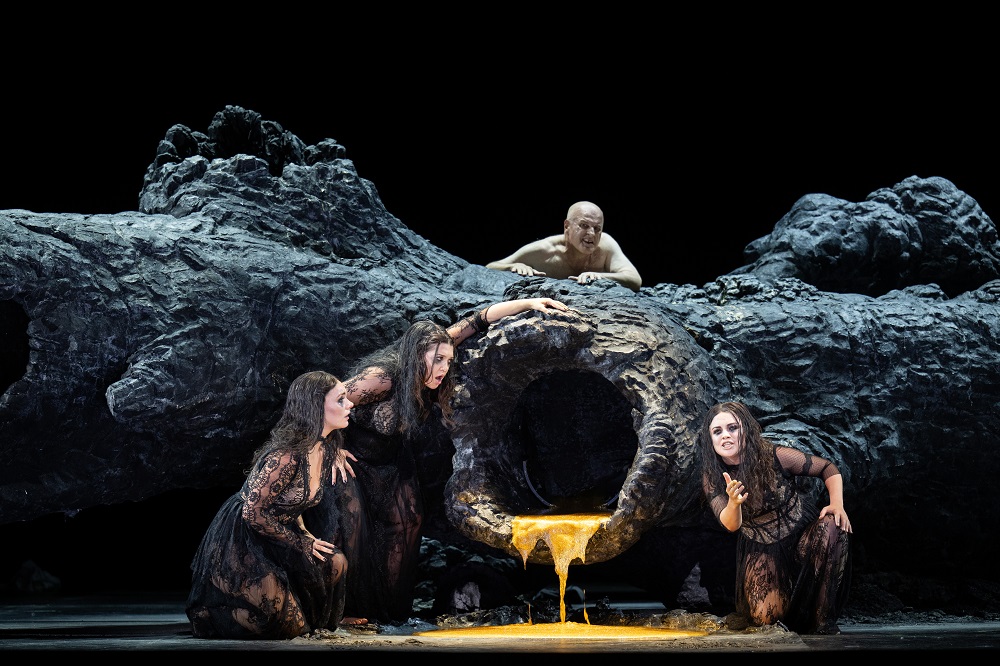 Lustrous sounds also come from Niamh O'Sullivan's golden-voiced Wellgunde (pictured above on the left with Katharina Konradi's Woglinde, Marvic Monreal's Flosshilde and Purves), and Wiebke Lehmkuhl's Voice of Erda, putting across the meaning from a distance as well as anyone. Panikkar's clarion tenor, matched to handsome presence, suggests just the possibility of a future in Wagner heroes (and why not? Windgassen and Jerusalem also sang Loge).
Lustrous sounds also come from Niamh O'Sullivan's golden-voiced Wellgunde (pictured above on the left with Katharina Konradi's Woglinde, Marvic Monreal's Flosshilde and Purves), and Wiebke Lehmkuhl's Voice of Erda, putting across the meaning from a distance as well as anyone. Panikkar's clarion tenor, matched to handsome presence, suggests just the possibility of a future in Wagner heroes (and why not? Windgassen and Jerusalem also sang Loge).
This is a Rheingold so classy on so many levels that everyone should see it. And given that seat prices rise to £325 and include an eye-watering £100 plus even for the ampitheatre, I don't think Kosky should be complaining about the livestream, which should captivate so many more people around the world. After all, many of us were first hooked on the Ring when Patrice Chéreau's ground breaking production appeared on the telly act by act. This should bring many new fans to Wagner's singular and ever more topical treatment of myth. Let's just hope that fire and flood don't completely overwhelm us before the cycle is completed.
Add comment
The future of Arts Journalism
You can stop theartsdesk.com closing!
We urgently need financing to survive. Our fundraising drive has thus far raised £49,000 but we need to reach £100,000 or we will be forced to close. Please contribute here: https://gofund.me/c3f6033d
And if you can forward this information to anyone who might assist, we’d be grateful.

Subscribe to theartsdesk.com
Thank you for continuing to read our work on theartsdesk.com. For unlimited access to every article in its entirety, including our archive of more than 15,000 pieces, we're asking for £5 per month or £40 per year. We feel it's a very good deal, and hope you do too.
To take a subscription now simply click here.
And if you're looking for that extra gift for a friend or family member, why not treat them to a theartsdesk.com gift subscription?
more Opera
 La bohème, Opera North review - still young at 32
Love and separation, ecstasy and heartbreak, in masterfully updated Puccini
La bohème, Opera North review - still young at 32
Love and separation, ecstasy and heartbreak, in masterfully updated Puccini
 Albert Herring, English National Opera review - a great comedy with depths fully realised
Britten’s delight was never made for the Coliseum, but it works on its first outing there
Albert Herring, English National Opera review - a great comedy with depths fully realised
Britten’s delight was never made for the Coliseum, but it works on its first outing there
 Carmen, English National Opera review - not quite dangerous
Hopes for Niamh O’Sullivan only partly fulfilled, though much good singing throughout
Carmen, English National Opera review - not quite dangerous
Hopes for Niamh O’Sullivan only partly fulfilled, though much good singing throughout
 Giustino, Linbury Theatre review - a stylish account of a slight opera
Gods, mortals and monsters do battle in Handel's charming drama
Giustino, Linbury Theatre review - a stylish account of a slight opera
Gods, mortals and monsters do battle in Handel's charming drama
 Susanna, Opera North review - hybrid staging of a Handel oratorio
Dance and signing complement outstanding singing in a story of virtue rewarded
Susanna, Opera North review - hybrid staging of a Handel oratorio
Dance and signing complement outstanding singing in a story of virtue rewarded
 Ariodante, Opéra Garnier, Paris review - a blast of Baroque beauty
A near-perfect night at the opera
Ariodante, Opéra Garnier, Paris review - a blast of Baroque beauty
A near-perfect night at the opera
 Cinderella/La Cenerentola, English National Opera review - the truth behind the tinsel
Appealing performances cut through hyperactive stagecraft
Cinderella/La Cenerentola, English National Opera review - the truth behind the tinsel
Appealing performances cut through hyperactive stagecraft
 Tosca, Royal Opera review - Ailyn Pérez steps in as the most vivid of divas
Jakub Hrůša’s multicoloured Puccini last night found a soprano to match
Tosca, Royal Opera review - Ailyn Pérez steps in as the most vivid of divas
Jakub Hrůša’s multicoloured Puccini last night found a soprano to match
 Tosca, Welsh National Opera review - a great company reduced to brilliance
The old warhorse made special by the basics
Tosca, Welsh National Opera review - a great company reduced to brilliance
The old warhorse made special by the basics
 BBC Proms: The Marriage of Figaro, Glyndebourne Festival review - merriment and menace
Strong Proms transfer for a robust and affecting show
BBC Proms: The Marriage of Figaro, Glyndebourne Festival review - merriment and menace
Strong Proms transfer for a robust and affecting show
 BBC Proms: Suor Angelica, LSO, Pappano review - earthly passion, heavenly grief
A Sister to remember blesses Puccini's convent tragedy
BBC Proms: Suor Angelica, LSO, Pappano review - earthly passion, heavenly grief
A Sister to remember blesses Puccini's convent tragedy
 Orpheus and Eurydice, Opera Queensland/SCO, Edinburgh International Festival 2025 review - dazzling, but distracting
Eye-popping acrobatics don’t always assist in Gluck’s quest for operatic truth
Orpheus and Eurydice, Opera Queensland/SCO, Edinburgh International Festival 2025 review - dazzling, but distracting
Eye-popping acrobatics don’t always assist in Gluck’s quest for operatic truth

Comments
Promising start to a new
Promising start to a new cycle and more restrained than I expected from BK.
Loge though was surely poorly directed? There is enough in the text so trust the composer as he usually knows bes.
Perhaps you could enlarge on
Perhaps you could enlarge on that? There was plenty of meaning from the Loge, and special co-ordination with Pappano and the orchestra, though of course no fire - the Zurich production's magic tricks added a dimension missing here.